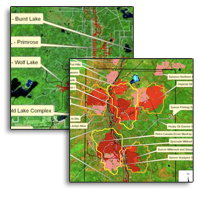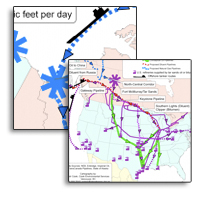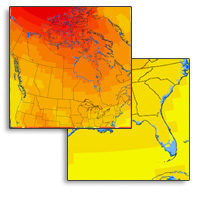Tar Sands 101
The Tar Sands "Gigaproject" is the largest industrial project in human history and likely also the most destructive. The tar sands mining procedure releases at least three times the CO2 emissions as regular oil production and is slated to become the single largest industrial contributor in North America to Climate Change.
The tar sands are already slated to be the cause of up to the second fastest rate of deforestation on the planet behind the Amazon Rainforest Basin. Currently approved projects will see 3 million barrels of tar sands mock crude produced daily by 2018; for each barrel of oil up to as high as five barrels of water are used.
Human health in many communities has seriously taken a turn for the worse with many causes alleged to be from tar sands production. Tar sands production has led to many serious social issues throughout Alberta, from housing crises to the vast expansion of temporary foreign worker programs that racialize and exploit so-called non-citizens. Infrastructure from pipelines to refineries to super tanker oil traffic on the seas crosses the continent in all directions to allthree major oceans and the Gulf of Mexico.
The mock oil produced primarily is consumed in the United States and helps to subsidize continued wars of aggression against other oil producing nations such as Iraq, Venezuela and Iran.
To understand the tar sands in more depth, continue to our Tar Sands 101 reading list
Utahns tar the tar sands
Utahns tar the tar sands
Denver Nicks | Oct 01, 2010 03:45 PM
High Country News
Mining of tar sands in Alberta Canada has left a landscape of razed boreal forest dotted with pools of toxic wastewater. It also produced 1.49 million barrels of crude oil last year – every day. Now, the first-ever commercial tar sands mine proposed in the United States is facing its second legal challenge from Western environmentalists.
Tribal Councils in U.S. and Canada Uniting Against Keystone Pipeline
Tribal Councils in U.S. and Canada Uniting Against Oil Sands Pipeline
By Elizabeth McGowan at SolveClimate
Thu Oct 7, 2010
Editor's Note: In late September, SolveClimate News reporter Elizabeth McGowan traveled to Nebraska to find out more about the Keystone XL pipeline that TransCanada plans to build to carry crude oil from the tar sands of Alberta to Gulf Coast refineries in Texas. This is the fifth in a series. Read Part 1, Part 2, Part 3 and Part 4 here.
"Is a tar sands truce possible?"
The money quote is here:
"Although Suzuki expressed surprise at Coutu's overtures, CAPP vice-president Greg Stringham says such meetings between companies and environmentalists happen all the time."
Mercury in eggs downstream from tar sands grows 50 per cent: study
Mercury in eggs downstream from oil sands grows 50 per cent: study
Bob Weber
Edmonton— The Canadian Press
Published Friday, Oct. 01, 2010
A study by Environment Canada indicates levels of toxic mercury in the eggs of water birds downstream from the oil-sands industry seem to have grown by nearly 50 per cent over the last three decades.
The study, one of the few to compare the region's ecosystem before and after its industrial boom, doesn't tie the increased mercury specifically to energy development.
Canada announces tar sands water review panel members
Canada announces oil sands water review panel members
By Stephanie Dearing.
+
Canada's Environment Minister, Jim Prentice, unveiled his picks for the six person review panel he had announced he would set up. The panel is to review all the Alberta oil sands water monitoring information.
Prentice's follow-through on his announcement to form the panel in September caught Alberta off balance, said The Tyee's Andrew Nikiforuk. The federal government of Canada has had a 'hands-off' approach when it comes to the oil sands developments.
Port will be key link in controversial Canadian oil project
Port will be key link in controversial Canadian oil project
By Aaron Corvin
Columbian Staff writer
October 1, 2010
Monday, the Port of Vancouver will display its ability to handle huge, odd-looking international cargo, generating revenue and fulfilling long-term economic-development objectives along the way.
Great Lakes Region: Refinery emissions could pollute our water
Refinery emissions could pollute our water
Published On Sun Sep 12 2010
David Israelson Special to the Star
As Canadians look with dismay at the aftermath of the BP spill in the Gulf of Mexico, it turns out that’s not the only place we need to worry about leaking oil.
What happened in the Gulf has implications for what happens to water in Canada, right here on the Great Lakes. There’s ever-increasing pressure to supply the oil-thirsty U.S. with more product from Alberta’s tar sands.
Fossil Foolishness: Utah's Pursuit of Oil Shale and Tar Sands
Fossil Foolishness: Utah's Pursuit of Oil Shale and Tar Sands
September 7, 2010
Karin P. Sheldon
Huffington Post
There's a saying in the West: "Whiskey is for drinking, water is for fighting over." This maxim could get put to the test as companies pursue development of tar sands and oil shale in Utah, the nation's second driest state.
More birds dying in tar sands than first reported: study
More birds dying in oil sands than first reported: study
CTV.ca News Staff
Tuesday Sep. 7, 2010
A new report suggests more birds are dying in Alberta's tar sands than the government has let on.
Government industries have estimated that on average, about 65 birds die each year from tailings pond exposure, according to the study released Tuesday. The mean annual rate was determined by analyzing the mortality rate between 2000 and 2007.
Syncrude chairman in Vancouver defends tarsands
Syncrude chairman in Vancouver defends tarsands
Chairman says carbon emissions have been reduced
By Damian Inwood,
The Province
September 10, 2010
Syncrude Canada chairman Marcel Coutu stood before a business-friendly Vancouver lunch crowd and fired a salvo in defence of the Alberta tarsands giant's environmental record.



